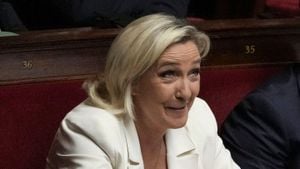TORONTO — Premier Doug Ford plans to call for a snap election next Wednesday, moving the election date from June 2026 to February 27, 2022. This decision, reported by multiple sources, follows months of speculation and foot-dragging on Ford's part.
Two senior government sources disclosed to The Canadian Press and CBC News the decision, indicating it stems from the need for Ford to seek a new mandate to tackle the looming economic pressures stemming from U.S. President Donald Trump’s threat to impose tariffs on Canadian goods.
“I’m asking for a mandate from the people of Ontario to make sure we protect them,” Ford stated during an unrelated announcement, emphasizing the urgency of establishing the funding necessary to shield communities and businesses from possible job losses.
Ford's Progressive Conservative party is set to hold a "super caucus" event Saturday to strategize on the election campaign, indicating the seriousness of his intentions. This meeting promises to be pivotal, equipping candidates with the necessary tools and frameworks needed for electoral success. An internal invite obtained by CBC News stated, "This meeting will provide you with the tools, training, and resources needed for a winning election campaign.”
Despite Ford's insistence on the necessity for this election, opposition leaders argue otherwise. “Today, Doug Ford has chosen himself over our province... His own political career, over the countless Ontario workers at risk,” said Liberal Leader Bonnie Crombie, reflecting the sentiments across the aisle.
Other opposition figures, including NDP Leader Marit Stiles, chimed in, stating, “It’s not 500,000 jobs he’s looking out for, it’s just his own.” Stiles criticized Ford for prioritizing his political ambitions over the welfare of Ontario’s workers, especially as it relates to the predicted fallout from U.S. tariffs.
During the recent political climate, the potential tariffs have emerged as significant issues. Ford had previously warned Ontario could lose upwards of 500,000 jobs if Trump follows through on his 25% tariff threat. This dire forecast has led Ford to plead for public support, citing the need for financial commitments necessary to navigate economic turbulence.
With Ford facing accusations of opportunism, many have noted the historical tendency of Ontarians to elect governments of differing political allegiances than those currently at the federal level. It was suggested by John Milloy, former Liberal cabinet minister, on why this timing might suit the Progressive Conservatives: “Doug Ford has been consistently ahead in the polls over the past several months.”
This claim is echoed by Andrew Brander from Crestview Strategy, who offered insights on the possible aims behind the snap election, arguing, “Choosing to call an election on one's own accord prior to the federal election gives you breathing room and patience with voters.”
Polls indicate rising support for Ford and the Conservatives, enhancing the perception of strategic timing. The opposition’s voices, meanwhile, echo stability concerns. Green Party Leader Mike Schreiner remarked, “The premier is now going to throw us... at a time when we need stability.”
Leading up to the anticipated election, the question remains on the minds of many: Is this election more about governance or political maneuvering? Ford has hinted at needing support to launch COVID-19-style economic initiatives, emphasizing, “The stronger the mandate the more powerful…”
Ford's announcement may come as no surprise to political watchers familiar with his approach. Following Trump’s election, Ford took the lead among Canadian premiers, actively demanding Ottawa prepare for incoming harsh trade measures.
Ontario’s political theatre seems primed for drama as many expect the questioning of Ford's motives will only intensify. With the actual election just weeks away, the looming decisions of Ontario’s electorate may shift the political wave or reinforce Ford's standing amid potential economic upheaval.
With federal elections also on the horizon, the timing and stakes are unmistakably high, as Ford works to negotiate not only the fate of his provincial government but also to uphold the livelihood of countless workers potentially affected by these stringent new economic policies.



